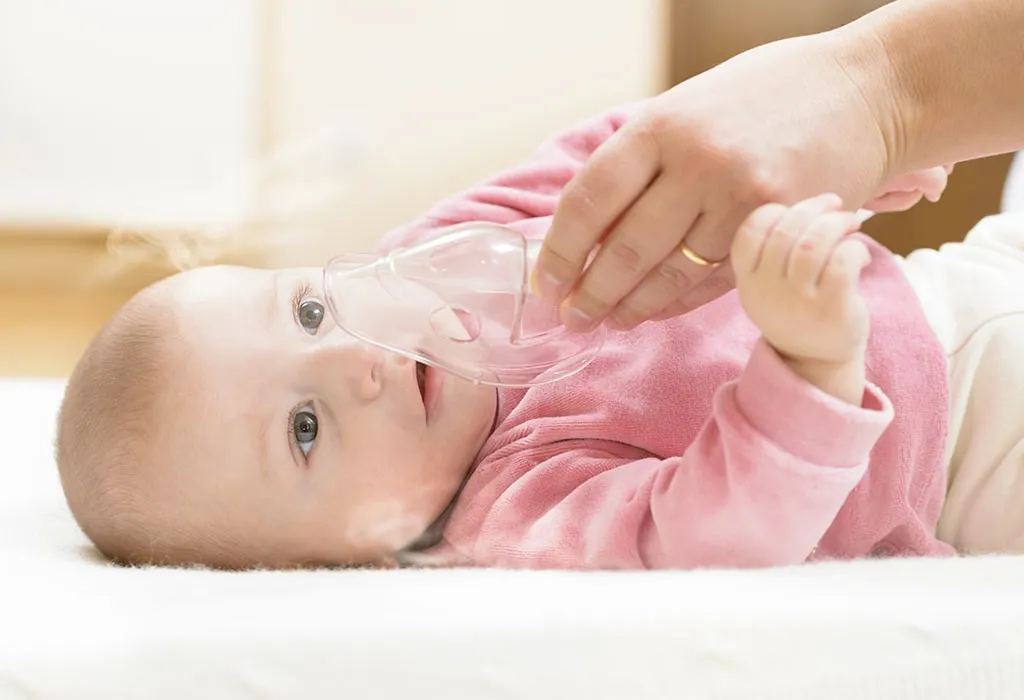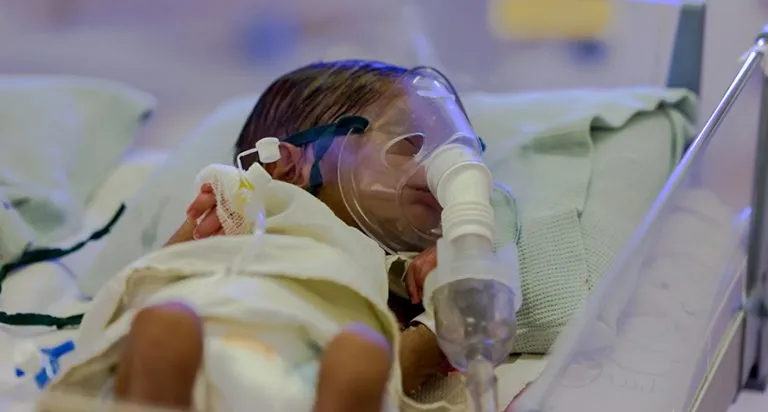Baby Gasping For Air – Causes, Symptoms, And Ways To Reduce It
The sound of a baby’s giggle, the first words, the tiny hands clutching onto a parent’s finger—are moments that are etched into the hearts of mothers and fathers worldwide. However, alongside these heartwarming instances, there are some unsettling moments too. One such example that can genuinely jolt a parent’s heart is witnessing their baby gasping for air while sleeping and lying on the back. The very sight evokes immediate concern, anxiety, and a plethora of questions. If you’ve ever witnessed this or are just trying to stay prepared, this article sheds light on why this may happen, what to watch for, and how to ensure your baby’s safety and comfort.
Is It Normal for a Baby to Gasp for Air?
Witnessing a newborn gasping for air can be a heart-stopping experience for parents. However, these gasps are often part of an infant’s natural breathing patterns and development, particularly during the early weeks. If this behaviour persists or is accompanied by other worrisome symptoms, it may be time to consult a paediatrician for further guidance. Always trust your instincts regarding your baby’s health and well-being.
What Are the Causes of Baby Gasping for Air?
As parents, we often wonder, “Why does my baby gasp for air?” This question is genuine and commonly experienced. When such an incident occurs, we often have a rush of thoughts and scenarios playing in our minds. However, understanding the causes can be enlightening and help us manage the situation better. Let’s delve into some prominent reasons that might be causing this.
1. Transient Tachypnea of the Newborn (TTN)
Some newborns might experience rapid breathing shortly after birth due to retained fetal lung fluid. This is called Transient Tachypnea of the Newborn (TTN) (2). This temporary respiratory problem happens when the fluid isn’t fully cleared from the baby’s lungs. Although it can be concerning, TTN typically resolves within 72 hours as the baby’s system absorbs or expels the remaining fluid.
2. Respiratory Distress Syndrome (RDS)
RDS is a breathing disorder primarily seen in premature babies. Their lungs haven’t produced enough surfactant, a substance that keeps the tiny air sacs in their lungs from collapsing (3). Babies need to work harder to breathe without sufficient surfactant, which might appear as gasping. Treatment often includes supplemental oxygen or surfactant therapy.
3. Laryngomalacia
This is a common cause of noisy breathing in infants. Laryngomalacia results from a softening of the tissues of the larynx (voice box) above the vocal cords (4). When the baby breathes in, these tissues can get sucked into the airway, causing obstruction. Most cases are mild, with the child outgrowing the condition by 18–24 months.
4. Gastroesophageal Reflux Disease (GERD)
GERD occurs when stomach contents flow back into the oesophagus (1). This can lead to the baby coughing, choking, or gasping. GERD is more than just occasional spitting up; it can affect the baby’s respiratory system and might require dietary or medical interventions.
5. Viral or Bacterial Infections
Respiratory infections like bronchiolitis or pneumonia can make breathing difficult for a baby. Symptoms include coughing, wheezing, and gasping for air (7). Such infections require prompt medical attention.
6. Choking
Babies explore the world orally and might accidentally swallow or aspirate small objects, leading to choking. Immediate intervention is crucial, so caregivers should be aware of first-aid techniques for choking infants.
7. Airway Anomalies
Some babies are born with or develop structural abnormalities in their airways, like tracheomalacia or bronchomalacia, causing them to gasp for air (5). Such conditions often require specialised medical evaluation.
8. Allergies or Asthma
Allergic reactions can cause inflammation and narrowing of the airways. While less common in infants, allergies or early asthma signs can lead to breathing difficulties, wheezing, or gasping.
9. Environmental Factors
Exposure to smoke, pollutants, or certain chemicals can irritate a baby’s lungs, leading to respiratory distress. Therefore, it is essential to ensure the baby’s environment is free from harmful irritants.
10. Pertussis (Whooping Cough)
Pertussis is a contagious respiratory disease that can be severe for babies (6). One of its hallmark symptoms is a “whooping” sound when the baby gasps for air after a coughing fit. Vaccination is a critical prevention method.
Awareness of these causes can empower parents, ensuring timely intervention or reassuring them that everything is okay. Always trust your intuition, and when in doubt, seek medical counsel.
Signs of a Baby Gasping for Air
When your baby randomly gasps for air, it’s a sight that can unsettle even the most seasoned parents. It’s crucial to discern between an occasional reflex and a recurring issue, especially in the formative months of an infant’s life. Recognising the signs associated with gasping can aid in determining whether there’s a potential concern.
- Frequent Pauses in Breathing: If your baby consistently stops breathing for more than 10 seconds before gasping, it’s a sign that requires attention.
- Blue or Greyish Skin Tone indicates cyanosis, where the baby might not get enough oxygen. Observe the lips, tongue, and around the eyes for these colour changes (8).
- Chest Retractions: If you notice the skin around your baby’s ribs, collarbones, or between the ribs pulling inward during breathing, it’s a sign of respiratory distress.
- Noisy Breathing: Persistent noises like wheezing, grunting, or stridor (a high-pitched sound) when breathing can indicate underlying issues.
- Persistent Coughing or Choking: If your baby constantly chokes, especially post-feeding, or has a chronic cough, it can be a sign of reflux or other respiratory concerns.
If you notice any of these signs repeatedly or in combination, consult your paediatrician to rule out any underlying health issues.
How to Reduce Gasping for Air in Babies?
The delicate sound of a baby’s laughter can quickly turn to concern when your baby sounds like gasping for air. It’s natural for parents to feel an overwhelming need to ensure their baby’s comfort and safety. Understanding ways to reduce and prevent these episodes can grant both the baby and the parent some relief. Here are some practical measures you can take:
- Proper Feeding Techniques: Ensure your baby is upright while feeding and always burp afterwards. This can help prevent them from swallowing excess air.
- Elevate the Baby’s Head: While sleeping, slightly elevate the head of your baby’s crib or bassinet. This helps reduce reflux, which can lead to gasping.
- Monitor Surroundings: Ensure the baby’s environment is free from irritants like smoke, strong fragrances, or allergens that can trigger respiratory issues.
- Humidifier: Keeping the air moist can help prevent nasal congestion, ensuring smoother breathing for your infant.
- Practice Tummy Time: Regular tummy time not only aids in muscle development but also helps release trapped gas.
- Clean the Nasal Passages: Using a saline solution and a bulb syringe, gently clear out any mucus blocking your baby’s nostrils.
- Maintain a Consistent Routine: A consistent feeding and sleeping schedule can help regulate your baby’s internal systems and reduce gasping.
- Stay Calm: Babies often pick up on their caregiver’s emotions. Remaining calm can reassure your baby, helping them regulate their breathing better.
Remember, while these tips can help in most situations, always trust your instincts. If you feel something isn’t right or if the gasping episodes increase in frequency or intensity, don’t hesitate to contact a healthcare professional.
When to Consult a Doctor?
The welfare of our little ones is always paramount, and no parenting manual doesn’t emphasise listening to one’s instincts. While baby gasping episodes can sometimes be part of standard developmental patterns, there are instances when it’s prudent to seek professional advice. Recognising these scenarios can ensure your baby gets timely care if needed.
- Other Respiratory Symptoms: Continuous wheezing, chronic coughing, or unusual breathing sounds should be addressed.
- Feeding Difficulties: If your baby often chokes during feedings or refuses to feed altogether, it’s a sign to consult a doctor.
- Disturbed Sleep: If your baby is restless, frequently wakes up gasping, or seems agitated during sleep, it might indicate an underlying issue.
- Developmental Delays: If your baby isn’t achieving the typical milestones or shows signs of developmental stagnation, discuss your observations with a healthcare professional.
- Physical Signs: Observe for chest retractions, flaring nostrils, or grunting. These can indicate respiratory distress and should be addressed promptly.
- Recurring Illness: If your baby frequently falls ill, has a persistent cold, or has other recurring health issues, it might be related to their respiratory health.
In parenting, it’s always better to err on the side of caution. Never hesitate to contact your paediatrician or healthcare provider if something feels off or concerning. They are there to assist, guide, and ensure your baby’s optimal health.
FAQs
1. Can teething cause my baby to gasp for air?
Teething can introduce many new experiences for your baby, including excessive drooling. This increase in saliva can sometimes lead babies to cough or occasionally gasp if it temporarily obstructs their airway. While a brief gasp due to this reason isn’t typically a cause for concern, always monitor for other signs or persistent symptoms that might necessitate a doctor’s consultation.
2. Why is my baby breathing fast while sleeping, and is it normal?
Rapid breathing during sleep can sometimes be a part of a baby’s developing respiratory system. It’s not uncommon for babies, especially newborns, to experience periodic breathing, where they breathe rapidly and then slow down, occasionally pausing for a few seconds. However, if fast breathing is consistent, accompanied by other distressing signs, or if you notice any colour change in your baby, it’s essential to consult with a paediatrician to rule out potential respiratory issues or other concerns.
Navigating the intricate journey of parenthood comes with its joys and concerns. While instances of a baby gasping for air can be unsettling, understanding the potential causes and signs can equip parents to respond with knowledge and calm. Always trust your intuition, and remember that seeking professional advice or reassurance is a sign of love and care for your precious little one.
References/Resources
1. Gastroesophageal Reflux Disease (GERD) in Infants; Nationwide Children’s Hospital; https://www.nationwidechildrens.org/conditions/gastroesophageal-reflux-disease-gerd-in-infants
2. Transient Tachypnea of the Newborn (TTN); Nemours KidsHealth; https://kidshealth.org/en/parents/ttn.html
3. Respiratory Distress Syndrome (RDS); National Heart, Lung, and Blood Institute; https://www.nhlbi.nih.gov/health/respiratory-distress-syndrome
4. McClay. J. E; Stridor & Laryngomalacia: Is My Baby’s Noisy Breathing Serious?; American Academy of Pediatrics; https://www.healthychildren.org/English/health-issues/conditions/ear-nose-throat/Pages/laryngomalacia-and-stridor-is-my-babys-noisy-breathing-serious.aspx
5. Varela. P, Schweiger. C; Congenital airway anomalies; PubMed; https://pubmed.ncbi.nlm.nih.gov/34172206/
6. Whooping Cough (Pertussis); Nemours KidsHealth; https://kidshealth.org/en/parents/whooping-cough.html
7. Justice. N. A, Le. J. K; Bronchiolitis; StatPearls; https://www.ncbi.nlm.nih.gov/books/NBK441959/
8. Respiratory Distress; Nationwide Children’s Hospital; https://www.nationwidechildrens.org/conditions/respiratory-distress
Also Read:
















